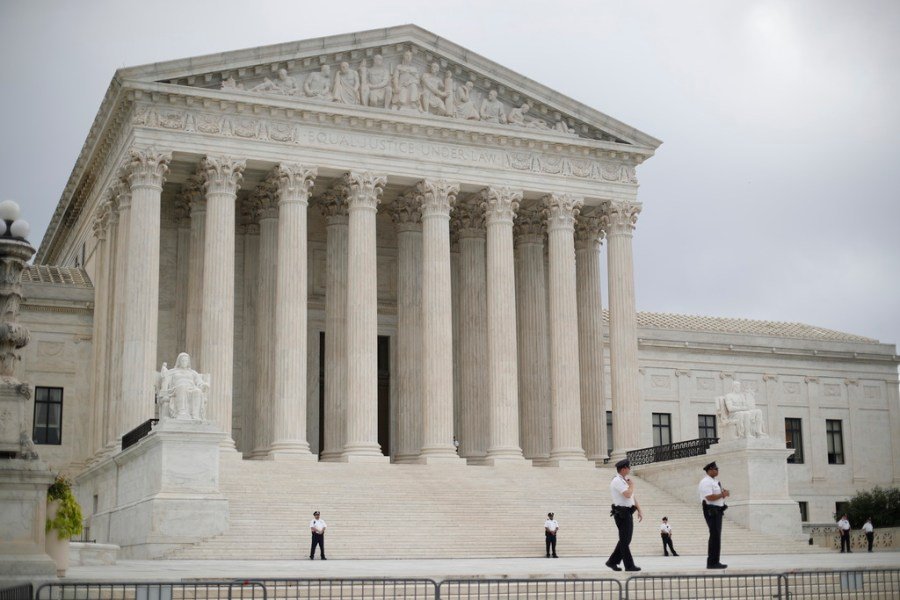
A former Kentucky clerk named Kim Davis has asked the Supreme Court to erase Obergefell v. Hodges, which recognized a constitutional right to same-sex marriage. Media outlets and progressive politicians have been quick to jump on the petition. “Like a horror movie,” read a USA Today headline.
It isn’t. The only horror is how easily people are manipulated by the media, and how little they understand about their own government.
A petition for review is not the same as an actual hearing. The court receives more than 7,000 such petitions annually and hears about 1 percent. Four justices must vote to grant review for a case to make it onto the docket. Last year, the court issued full opinions in just 59.
There are all kinds of frivolous petitions; MyPillow CEO Mike Lindell filed one over the FBI’s seizure of his phone during its election fraud probe. Technically, the Supreme Court will “consider” Davis’s petition, but in reality that means only that a piece of paper has been filed.
The case itself isn’t about same-sex marriage at all. Davis, a county clerk, refused to issue licenses to same-sex couples after the Obergefell case was decided, claiming her religious beliefs excused her. She was jailed for contempt. Several couples sued her and won $100,000 in damages. What Davis now asks the court to consider is whether the First Amendment’s protection of religious exercise could shield her from liability; only at the tail end of her appeal do her lawyers tack on a request to overrule Obergefell.
So, when Newsweek quotes Davis’ lawyer as “optimistic the court will take the case,” what he’s really arguing is whether Davis can invoke religious liberty as a defense for unlawful discrimination. Conservative judges, including two appointed by President Trump, have already said no.
Meanwhile, the Respect for Marriage Act, passed in 2022 with bipartisan support, guarantees federal recognition of same-sex marriages. Public approval for marriage equality remains strong. The odds of Congress repealing that law are virtually nil.
And that’s the bigger point. The Supreme Court simply simply no interest in revisiting the issue. Chief Justice John Roberts joined a decision protecting same-sex parents. Justice Brett Kavanaugh called same-sex marriage a “very important right” and said gay Americans “cannot be treated as social outcasts or as inferior in dignity and worth.” Roberts and Justice Neil Gorsuch joined the 2020 ruling protecting gay workers from employment discrimination. Kavanaugh dissented, but praised gay Americans’ “vision, tenacity, and grit” and explicitly said that Roe’s fall “does not threaten or cast doubt on” Obergefell.
That doesn’t guarantee the conservative bloc believes Obergefell was rightly decided. But it does suggest that undoing it is not high on their list. Courts, like politicians, have finite capital, and they choose their battles.
None of that stopped Davis’s request from snowballing into a national story.
The regular partisan actors and even more serious outlets like ABC couldn’t resist acting as if gay marriage were on the chopping block. “Ten years after the Supreme Court extended marriage rights to same-sex couples nationwide, the justices this fall will consider for the first time whether to take up a case that explicitly asks them to overturn that decision,” ABC wrote on X. Even though its own article described the case as a “long shot,” the framing makes it seem as if Obergefell was under immediate threat.
That kind of framing may not be malicious, but it is damaging. Very few understand what it takes for a case to reach the high court. Many people don’t know how many justices there are and cannot name them. Many don’t even know which branch of government the Supreme Court belongs to. So it is no surprise they do not understand petitions for certiorari or the mechanics of overturning precedent.
Even politically informed citizens often think a conservative-majority court will automatically hand down conservative rulings. That is not how it works. The Supreme Court follows strict procedures and operates with caution; it is not a partisan plaything.
Obergefell is not Roe. It has not produced a decades-long Republican crusade to topple it, and Kim Davis’s appeal will certainly not change that. The real story here isn’t about the fate of same-sex marriage but about how easily media and partisans can spin a hopeless filing into an existential threat towards a right that is, in truth, secure.
William Liang is a writer living in San Francisco.






